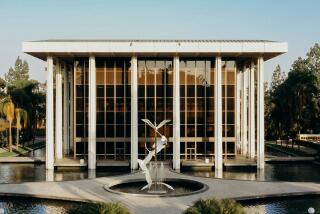MUSIC REVIEW : Neville Marriner, Academy at Ambassador Auditorium
- Share via
When the Academy of St. Martin in-the-Fields first set up shop in a London church, it represented the state of the early music art. Neville Marriner led a doughty little band in Baroque specialties, and through recordings soon captured audiences well beyond Trafalgar Square.
Thirty years later, the academy is the musical equivalent of heavy industry, exporting ensembles from quintets to a symphony orchestra around the world on seeming perpetual tours. It has long since lost the lead in period performance, but has kept a high profile with music consumers through the versatility represented in more than 400 recordings and the sound tracks for “Amadeus” and the current “Valmont.”
Marriner brought the big version of the academy to Los Angeles for the first time in 1988, for five concerts at Ambassador Auditorium as part of the UK/LA Festival of faint memory. Monday they returned to Ambassador with the first of two programs.
The academy, 62 strong in this incarnation, produced the familiar lean, lithe sound and transparent, treble dominated textures. It played a tough, varied program with great verve and stylish pertinence.
The big piece for the full band was Schumann’s Symphony No. 4, in D minor. Marriner set a brisk pace, keeping the focus on forward direction and structural interconnections. In doing so, he skimped on tenderness--though the soloists in the Romanze proved sweet and lyrical, if rushed--and seemed to encourage the eagerness that led the violins into several early entrances.
But the whole proved fresh, clean and spirited. Marriner may not have indulged in much probing dissection, but he expressed the formal integrity and inventiveness of the piece clearly.
A contingent of the strings was given the gratefully plush, achingly nostalgic assignment of Richard Strauss’ “Metamorphosen.” Here Marriner allowed room for nuance and solo indulgence, while keeping tight rein on the pathos potential--drama and urgency, yes; unfocused sentimentality, no.
Trumpeter Mark Bennett and English hornist Celia Nicklin supplied burnished sound and balanced ensemble in the solo roles in Copland’s “Quiet City.” Their elegance and moody understatement were anchored by the even accompaniment of Marriner and Co., given a modest and entirely appropriate shimmer.
Marriner began the evening with Berlioz’ Overture to “Beatrice et Benedict.” Here the emphasis was on vigorous bustle, slightly breathless at times but well-brushed and carried out with elan.
It took much coaxing and the vestiges of a standing ovation from the less than capacity audience, but eventually Marriner took the podium for two encores: a very fast, exaggerated “Hungarian Dance” No. 1 by Brahms, and a poignantly subdued slow movement from Mendelssohn’s “Reformation” Symphony.
More to Read
The biggest entertainment stories
Get our big stories about Hollywood, film, television, music, arts, culture and more right in your inbox as soon as they publish.
You may occasionally receive promotional content from the Los Angeles Times.










